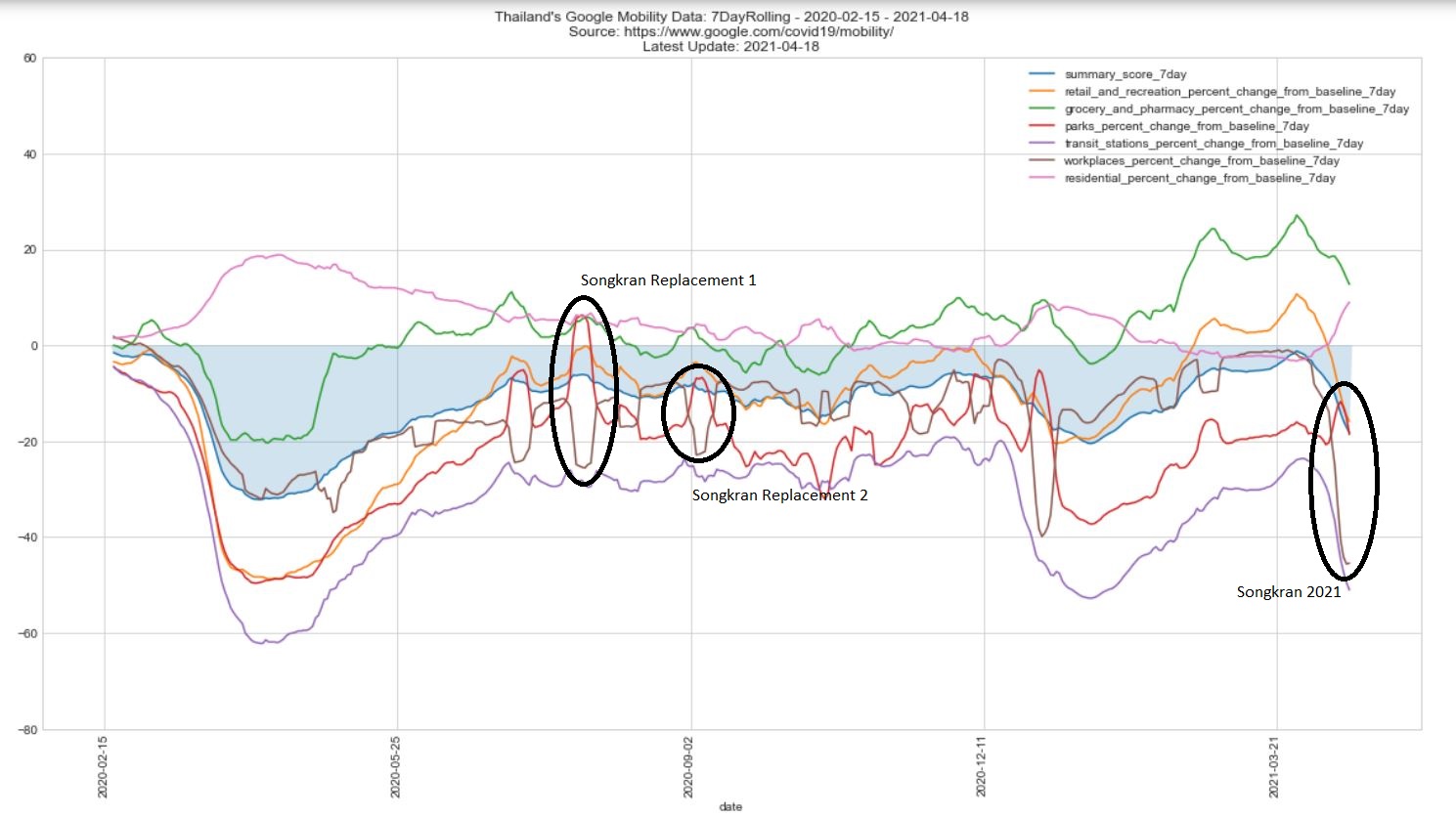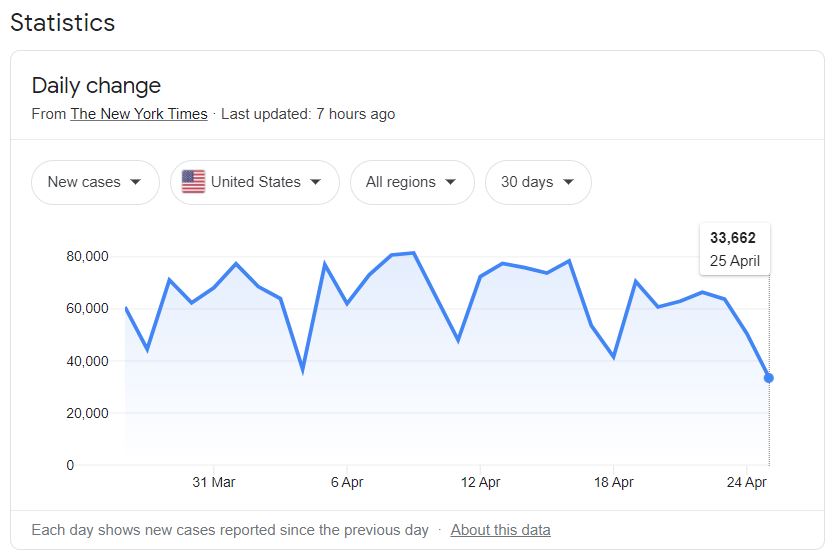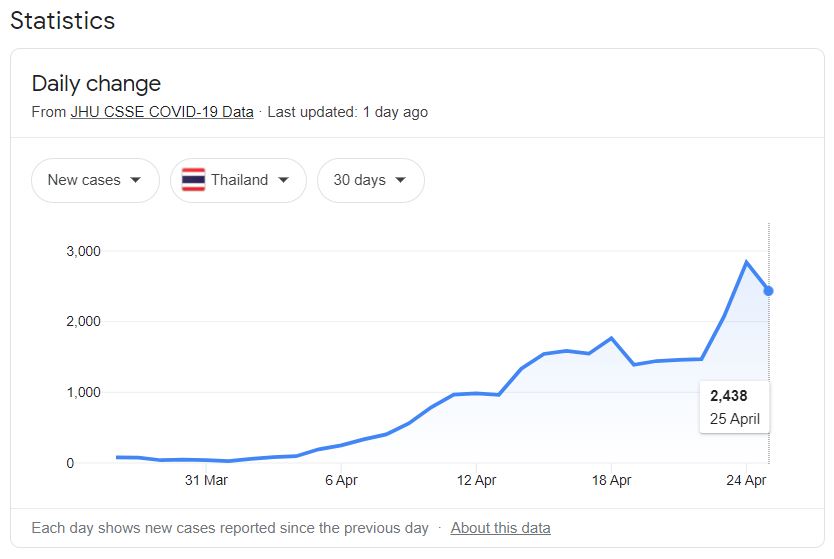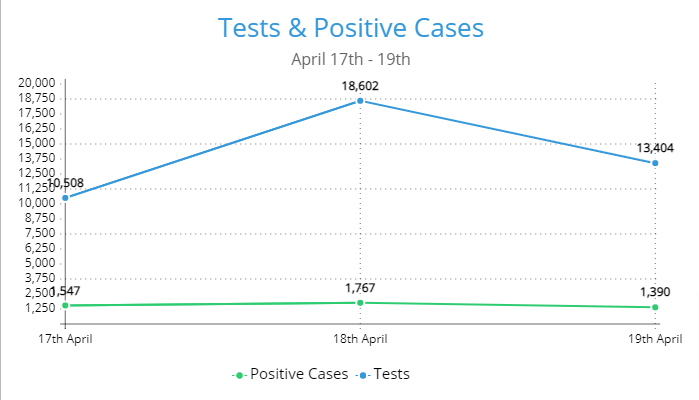
Osthos
-
Posts
30 -
Joined
-
Last visited
Content Type
Events
Forums
Downloads
Quizzes
Gallery
Blogs
Posts posted by Osthos
-
-
- Popular Post
She's right. If Thailand is going to be battling the Delta variant, then we have no actual data on how effective it is.
As I posted elsewhere, both the Pfizer/Biontech and AZ vaccine are over 90% effective in preventing people from needing hospital treatment, as per a UK Government report yesterday.
Vaccines highly effective against hospitalisation from Delta variant - GOV.UK (www.gov.uk)
-
 2
2
-
 1
1
-
- Popular Post
- Popular Post
Thailand should shop around for any countries not using their ordered AZ shots instead of plugging the shortfall with Chinese vaccines with limited testing publications (But don't get me wrong, ANY vaccine right now is worth having).
Some good news to come out of the UK yesterday, two shots of the Pfizer/Biontech and AZ vaccines are highly effective in preventing people needing treatment in a hospital when infected with the Delta variant.
The results from the study are:
- the Pfizer-BioNTech vaccine is 96% effective against hospitalisation after 2 doses
- the Oxford-AstraZeneca vaccine is 92% effective against hospitalisation after 2 doses
Vaccines highly effective against hospitalisation from Delta variant - GOV.UK (www.gov.uk)
Good for Thailand if AZ is going to be the main shot of choice for the public.
-
 1
1
-
 2
2
-
The statistics aside, the good Doctor brings up an interesting argument. That is the country should focus on getting as many people jabbed with the first shot, regardless of supplies for the second shot. Essentially going with the UK vaccination strategy of 12 weeks apart for each shot with the AZ vaccine.
Given the success of the vaccine rollout in the UK and the clear effectiveness of their strategy, it's certainly something to consider.
-
I swear we see this headline every few months. Like clockwork.
-
Just now, elliss said:
Any Scientific links ....
This one is specific to the AZ vaccine. The key points are:
- 100% prevention from hospitalisation.
- 70% protection after the first dose.
- 67% reduction in transmission of virus.
The last stat shows that some vaccinated persons are still able transmit the virus if they are infected.
-
3 minutes ago, Bkktodd said:
Cant safe open up until majority of thai are vaccinated...yet the majority of arrivals are vaccinated now. I dont see the logic. Thai would be safe vaccinated: then thais would be safe around vaccinated and covid free arrivals.
Getting vaccinated doesn't mean that you can't be infected with the virus, it just means that the virus won't kill you. A vaccinated traveler who's infection was missed by shortened quarantine is still able to infect a Thai person with the virus, therefore Thai's are not safe until a majority of them are vaccinated.
-
 1
1
-
-
18 minutes ago, Blumpie said:
Before agreeing to put AZ into my body, I researched if I should get it.
The studies showed that AZ may be better are stopping variants than the others, because the trial data included variants whereas the others didn't. IF it had, it would probably be closer to the 90 percentile.
The 67 percent efficacy means that if you do get sick, your symptoms will be mild and will clear up like a cold.
In other words, get what you can get. There is a lot more to think about than looking at those numbers. There is a lot of disinformation on the internet, and this may be one of them.
I could have waited another 2 weeks for a "better" one but I chose AZ just to get it as soon as possible.
This is true. The best vaccine for you is the first one that is offered to you. All of them are proven to be close to 100% at preventing you from dying of Covid, yes even the Chinese ones. However, where you are protected from the disease killing you if you become infected, it doesn't entirely prevent you from transmitting it to others.
This is where the slow acquisition and administration of vaccines is a problem for Thailand. They can't safely open up until and majority of Thai's have been vaccinated, where even if the virus enters the country, it won't be able to kill anyone.
I should also clarify the 67% number for the AZ vaccine isn't the efficacy number. Recent studies in the UK, Brazil, and South Africa say the AZ vaccine reduces transmission of the virus by 67%, whilst the efficacy is above 70%
-
 1
1
-
 1
1
-
-
While I'm gutted for myself, as I had planned to be in Bangkok April 23rd, before the third wave cancelled all of my meetings with clients, I get where they're coming from.
Politically, they have to treat all of the vaccines as equals, even though Pfizer/Biontech and Moderna's real world results are head and shoulders above the rest. Where both mRNA vaccines have shown to be >90% in preventing infection, and therefore transmission, the others are not near that percentage. AZ's numbers from UK's studies show 67% effectiveness in preventing transmission, and Sinovac's numbers are all over the place.
Where those vaccinated with the mRNA ones are highly unlikely to be able to spread the virus if shortened quarantine misses infections, the same can't be said for the others.
-
 2
2
-
-
12 minutes ago, ukrules said:
This is excellent news, the AZ vaccine is proving to be very effective in the UK where they are using it to vaccinate about half the people (the older half) based on what I've read, Pfizer being the other main vaccine used over there.
I believe they're not manufacturing this in isolation and it's supervised by AstraZeneca - the vaccine output from the factory should be identical in every way to that being produced in Europe.
This will stop COVID dead, they should still however not only rely on one vaccine.
If I was in charge we would be have tens of millions of doses of both the Pfizer and Moderna vaccines on order as well.
It has been suggested that the Moderna vaccine is more suited for the younger members of the population.
The next step would be to discuss whether or not to follow the UK's vaccination strategy. That is concentrating on getting as many first doses into arms as fast as possible and then delay the second dose to up to 12 weeks.
It doesn't seem necessary given the relatively low spread of the virus in Thailand. But given the latest numbers on the AZ vaccine being giving 70% protection and reducing transmission by 67% in the UK, it would help Thailand reduce the risks in opening up quicker for tourism.
-
1 hour ago, TallGuyJohninBKK said:
"Approved by CCSA Thailand, 14-day quarantine will start May 1st, 2021 in all traveller entering Thailand after the situation in Thailand is gradually increasing. 3 counties namely India, Pakistan, and Bangladesh must quarantine for 21 days"
https://www.facebook.com/OICDDC/posts/3905861762867721
Any mention of changes for vaccinated travelers? If my 7-day got increased back to 14 day quarantine, then that's a death knell for my business trip.
-
4 minutes ago, Joinaman said:
3,000 mark ?
Infections or deaths ?
8 minutes ago, Joinaman said:so assuming that they actually manage to arrive at this figure, then it will take around 220 days to administer the first dose
But what's the betting this figure is never achieved , or not for a long time
Infections. For whatever reason, the trend over the past two weeks has seen a spike in the numbers reported in Saturday.
Labs rushing to report results before the end of the week? Slowed on purpose because people couldn't find beds?
As for vaccinations, if they're able to do 50k a day at this point, I think the infrastructure to deliver jabs is clearly there and they can easily scale up if they plan properly. But the bottleneck has always been number of doses available.
-
 1
1
-
-
Still very concerning that the numbers have not yet started to decline. If the patterns of previous weeks hold, then we're still expecting an end of the week spike towards the 3,000 mark.
Hopefully those spikes were caused by the lack of hospital beds, and with the backlog of patients looking for beds mostly cleared, we can see more stable daily numbers.
-
I wonder if things get desperate, if Thailand would pull and India and refuse to export the vaccines until the population is vaccinated?
I'm asking this question because the AZ vaccine has proven, in Europe, to be difficult to manufacture compared to the mRNA ones. Europe has been reporting a big shortfall in AZ vaccines.
-
 1
1
-
-
8 minutes ago, DavisH said:
I don't see that much in our data. We still had high numbers last saturday and sunday (and actually lower in the followign 2 days). Look at the numbers from Texas for a weekend effect.
The dip in cases for Sundays (revealed Mondays) is there for Thailand, at least for the past three weeks. But for whatever reason it's not as pronounced as for example the US or European countries.
Source: Google daily Covid cases
-
1 minute ago, Kinnock said:
True ..... but the positive % is not increasing in the graph.
I think it's too early for the data to tell us anything about the outbreak. It's only been 6 days since the new restrictions came effect and a few after Songkran travel. Given the incubation period of the virus, right now it's not telling us if the restrictions are lowering infections or if Songkran travel screwed us all, big time.
-
 1
1
-
-
4 minutes ago, Kinnock said:
I'm probably interpreting this incorrectly - but if the % of tests with positive results is staying at about the same level, then doesn't this mean that the increasing number of cases being reported as a "new wave" is really just down to increasing test numbers?
The % of people found to be positive has stayed about the same, so presumably the number of people in the community who are positive has also stayed static?
The reported rise in death figures are not a reliable indicator either, as people die all the time of other causes and some may also have COVID, but testing has increased. And hospitalization is directly related to testing too - as in Thailand it's compulsory for positive tests.
And testing increased just before Songkran as people wanted a negative test cert to travel - then as you mentioned total testing volumes increased to keep pace with the increased number of positives being found.
I'm not trying to say cases are not increasing in reality - I think that's inevitable with new strains, COVID fatigue and limited vaccination - but I think we have no idea about the true situation.
Whilst testing is certainly not at the number needed or wanted, I think the trends from testing is the most valuable information. If you're testing the same number each day and the positive percentage is rising, then infections are rising and vice versa.
The limited amount of testing isn't helping with getting the outbreak under control, but it does tell us whether or not the infection rate is going up or down. It tells us if we need more restrictions to control the outbreak.
-
- Popular Post
- Popular Post
For anyone looking for a bit of good news, this chart compiled by Peter Scully PhD, with mobility data from Google, suggests that a lot of people stayed home and did not travel during Songkran (relative to public holidays last year).
The chart below shows during the replacement Songkran holidays in 2020, visits to parks (defined by Google as national parks, beaches, marinas, dog parks etc...) was inversely proportional to visits to workplaces. Meaning visits to "parks" rose as much as visits to "workplaces" fell. Meanwhile during Songkran 2021, visits to "parks" increased much less than the amount of visits to "workplaces" fell.
Make of that what you will, I'm hoping the virus spread during Songkran won't be hard as we were expecting.
Source: dashboard-covid-19-thailand_april23rd2021_pm.pdf (wordpress.com)
2021-04-18_TH_Mobility_Report_en.pdf (gstatic.com)

-
 3
3
-
- Popular Post
- Popular Post
1 minute ago, Sheryl said:Of the 4 fatalities, one was only 29 years old.
Most of the fatalities so far in the 20-40 range have been people with obesity.
Time to lay off the processed foods, sugar, and carbs, return to a more traditional diet.
-
 2
2
-
 1
1
-
8 minutes ago, wensiensheng said:
This seems to show a positivity rate of very close to 10%. That seems pretty high to me and cause for concern.
It's showing a serious outbreak, but there is some small comfort that the positivity rate is not trending upwards over the past few days.
-
 2
2
-
-
2 minutes ago, dinsdale said:
How on earth can you say this. The gov't itself said they are turning people away from tests because
they can't handle it.
Right. If we're going by these reports, they are turning away people who don't have symptoms in favour of testing those who do. And in testing those who do have symptoms, on the 19th of April they are getting a positivity rate of 10.3%.
And we know that around 30% of Covid cases are asymptomatic. If testing is missing a huge number of cases then the positivity rate of those with symptoms has to be much, much higher than 10.3%.
-
 2
2
-
 1
1
-
-
4 minutes ago, dinsdale said:
Guess you didn't read my previous post.
Sure. But you have provided one data point, and although such qualitative data is appreciated, one or even ten data points can hardly be extrapolated into a clear bigger picture.
Current testing is for sure missing cases but the data doesn't suggest a huge number is being missed.
-
3 minutes ago, LosLobo said:
I disagree!
How high is too high?
The higher the percent positive is, the more concerning it is. As a rule of thumb, however, one threshold for the percent positive being “too high” is 5%. For example, the World Health Organization recommended in May that the percent positive remain below 5% for at least two weeks before governments consider reopening. If we are successful in bringing coronavirus transmission under control, this threshold might be lowered over time. To further relax social restrictions and allow very large gatherings or meetings of people traveling from many different areas, for example, we would want a lower threshold.
Oh for sure, we would all be comforted by a greater amount of testing. That kind of data would let us know if more or less restrictions are needed.
We are just at the beginning of this outbreak, the current data suggests that although the spread is serious, it doesn't suggest that current testing is missing a huge number of cases in the community. Hopefully when they can sort out the logistics of the field hospitals/isolation centres, then they can confidently test more of the community without worrying about overwhelming the number of beds available with patients.
Whilst I don't put much faith in the Junta, my experiences with the bureaucracy and professionalism of the Thai healthcare system has been fairly ok. Hopefully they can succeed in spite of being hamstrung by the current minister.
-
- Popular Post
- Popular Post
26 minutes ago, Bkk Brian said:Tests 3 day period from 17th - 19th April, waiting for the latest ones.
Looking at this data, Thailand is currently testing just short of the rate recommended by the WHO. The WHO recommends one positive case for every ten negative as the benchmark for adequate testing.
This translates to a 9% positivity rate for adequate testing. From the data above the positivity rate for April 17th: 14.7%, April 18th: 9.4%, April 19th: 10.3%.
I think from this data, we can surmise this outbreak is not yet under control, but is also not exploding into a worrying problem. But upping the testing would certainly give us a clearer picture.
Edit: Syntax
Positivity rate adequacy source: who-audio-emergencies-coronavirus-press-conference-full-30mar2020.pdf
-
 5
5
-
5 hours ago, morrobay said:
And anyone not willing to quarantine for 14 days probably not willing to quarantine 10 days
Have to say, as someone's who's vaccinated and wanting to come back to Thailand on business, 7 days is a hell of a lot flexible than 14 or 10 days.





฿1-2bn Baht per day loss expected due to new restrictions – Commerce Chamber
in Thailand News
Posted
I wonder how many vaccines the country could have ordered just from the government revenue lost with this outbreak? If the people were vaccinated, they could already be seeing mass tourism from the US and Europe already.
Not opening the pocketbook has ironically cost them more they could have corruptly siphoned off in a more normal economy.